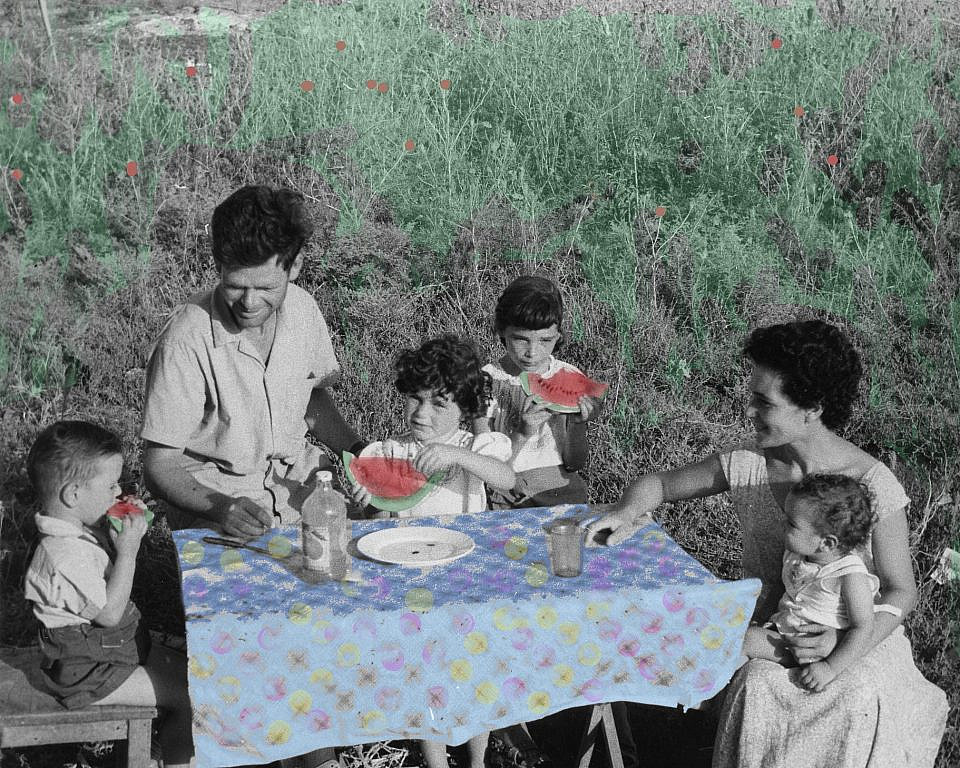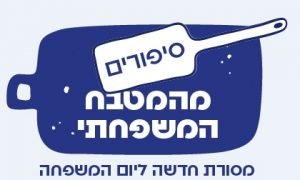
Family Day events from FOODISH, the culinary department of ANU – Museum of the Jewish People
For Family Day this year, we invite you to join us for a series of events about food, family and culture. Our “Family Food Stories” project, launched to coincide with this year’s Family Day, invites you to celebrate the power of the family meal and culinary traditions as an opportunity for dialogue and forging connections that span generations.
In addition to the events listed for February 26th, visitors will also be able enjoy a boutique Jewish food fair with kugel, fricasse and other ready to eat delicacies, Israeli wine, coffee from the Beresau roastery, and more. You can also participate in a give-and-take cookbook fair, happening in the museum lobby – bring your used cookbooks (in good condition only, please) and swap it for a different book looking for a new home.
The events detailed below are all included in the museum’s cost of admission.
During the same hours, visitors will be able to satisfy their appetites at a boutique Jewish food fair with kugel, fricassee and other delicacies; glasses of Israeli wine; coffee from Beresau roasters and more. A give and take cookbook fair will also be held in the lobby and museum visitors are invited to bring used books (good condition only) in need of a new home.
All the events are held in Hebrew.
17:00 Jerusalem Pots: Jerusalem’s Cuisine During the British Mandate and Austerity – Zeevi Hall (Hebrew)
Necessity is the mother of invention – so it is not surprising that in a city that knew both sieges and shortages, incredibly creative dishes were conceived: “soup” from whey and dried bread crumbs, an intestine stew with vinegar and parsley, stuffed khubeza leaves, and bread dipped in the pickling liquid of pickled fish. Click here for full details
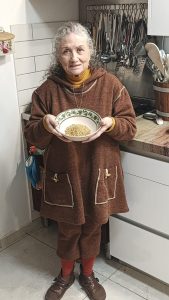
***
17:00 (once again at 19:00) Abol, Tona, Baraka: an Ethiopian Coffee Ceremony in Memory of Beresau Avraham Ovagen (Hebrew)
In Ethiopian culture, making coffee is a ritual – it is a moment of gathering, contemplation, and conversation around which the family, community, or friends can commune during significant events, whether happy or sad. Buna, as the coffee ceremony is called, is based on an ancient tradition of thousands of years. It begins by roasting green coffee beans over hot coals and grinding them into powder using a mortar and pestle. The coffee is brewed in a jebena, a traditional clay kettle, and poured into small cups as blessings and well-wishes are recited.
As part of the Family Food Stories 2025 event series, Derese Ovagen invites the public to an Ethiopian coffee ceremony, which will be woven into the story of the Ethiopian Bnei Israel community, Derese’s family story and the story of his younger brother, Beresau Avraham Ovagen, who was killed in the northern Gaza Strip in February 2024. Click here for full details
*In the case of inclement weather, the event will take place inside the museum
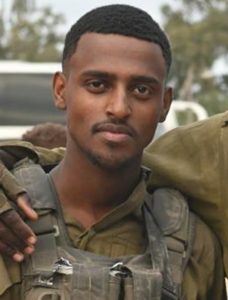
18:00 Mrs. Bagel and Mr. Herring: Jewish Culinary Surnames – Zeevi Hall (Hebrew)
ANU – Museum of the Jewish People has the world’s only database of Jewish surnames, which contains about 20,000 entries and is growing all the time. Hagar Doron, Director of Databases at the museum, will speak about Jewish surnames related to foods and ingredients, their meanings and the reasoning behind names such as Weisbrut (“white bread” in Yiddish), Zeurafel (“sour apple” in German), pepper, jam, halvah and more. Joining her in conversation will be “Mrs. Bagel” – curator Keren Bar Gil, scion of the founders of the Bagel-Bagel empire, whose work connects art and food. Click here for full details
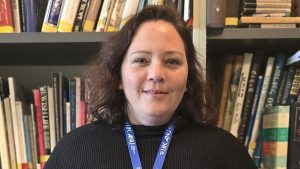
18:00 Pass the Couscous: The Secret Rituals of Moroccan Women – Chronosphere Auditorium (Hebrew)
“It all started with my cousin Isabelle in Paris, who shared a juicy secret at a family gathering: ‘Years ago, in Casablanca, our grandmother and her friends would get together once a month, for a girls night, and serve Shakshu Delashob – couscous seasoned with a secret local mixture of herbs, saffron, and…hashish’.” So says Hana Zohar Ehrlich, who was intrigued by Isabelle’s story, and began to ask around about it, to other relatives, friends and expatriates from Morocco. Click here for full details
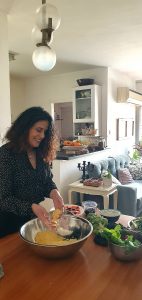
***
19:00 The Food Stories of the Jewish People: A Guided Tour (Hebrew)
What would we see if we peeked into the Jewish kitchens of the past? Perhaps King David packing the biblical snack, kali, before going into battle with Goliath? The women of New York’s Lower East Side neighborhood fomenting rebellion against local butchers? Or maybe a descendant of Spanish conversos, sneaking into the basement to season his meat, away from the prying eyes of The Inquisition? This guided tour at ANU – Museum of the Jewish People invites you to peek into the kitchens, and the pots, that tell our story.
During the tour you will hear about the key role of Jewish merchants in disseminating chocolate across the globe; go behind the scenes of a controversy between two competing confectioners’ for the right to claim ownership of the most popular cake in Austria; and finally understand why couscous is served on Tuesdays, all in the aid of answering the question of “What exactly is Jewish food – and is there even such a thing?”.
***
19:00 A Journey Amongst Spices: Cuisine from 4 Jewish Indian Communities (Hebrew)
Flower shaped cardamom spiced cookies; a savage spice known as “devil’s glue”; chamin with mustard greens, green bean leaves and bamboo; and a bitter legume stew to break the Tisha B’Av fast – as part of the Family Food Stories 2025 series of events, we invite you to join us for a journey amongst 4 different fascinating Jewish Indian cuisines.
Indian Jewry consists of 4 different communities, which settled in different areas of the Indian subcontinent over the course of different time periods, each with a unique set of customs and cuisine.
The Bnei Israel community is the oldest and most mysterious of them. The community attributes its origins to a shipwreck near the Konkan coast, in present-day Maharashtra. The date is a matter of controversy – some claim it parallels the exile of the tribes of Israel, and some attribute it to the period of Syrian Greek rule in Israel – but either way, since the community was isolated from other Jewish communities and there is no written record of these events, the circumstances surrounding its arrival in India remain shrouded in mystery.
The Cochin community lived in Kerala in the southwest of India, in the Malabar Coast region. The first Jews came to the area in the days of King Solomon, bringing ivory and parrots for the First Temple. Jews from the Kingdom of Persia followed, after the conquest by the Muslims in the 7th century. Another, smaller group arrived in the Kerala region after the Jewish expulsion from Spain.
The Baghdadi community arrived in India from Iraq in the late 18th and early 19th centuries. They fled persecution in Baghdad and Basra and settled mainly in the cities of Calcutta, Mumbai
and Pune. They were joined by other Ottoman Empire Jews – from Yemen, Afghanistan, Iran and Aleppo in Syria.
The Bnei Manasseh believe themselves descendants of Tribe of Manasseh, which was expelled from the Land of Israel at the end of the First Temple period. According to traditional lore, they migrated eastward and reached as far as China, where they were treated cruelly, forced into slavery, and then expelled from the region. When they left China, the “Holy Book”, the Torah book that was in their possession, was lost or stolen, and since then their tradition has been passed down orally. Although there is some controversy with regards to their Halakhah, they believe in one God, celebrate Jewish holidays such as Shavuot, Passover and Yom Kippur and observe various Jewish customs.
As part of the Family Food Stories 2025 series of events, ANU- Museum of the Jewish People will host 4 cooks from each Indian Jewish community to speak about their unique cuisine:
Elizabeth Binyamini of the Bnei Yisrael community grew up in Gujarat in Northwest India. Elizabeth will tell us about the spices unique to this cuisine, such as Ajwain – a spicy, bitter seasoning similar to cumin used to season baked goods, curries and snacks; khalo – a traditional Indian seasoning so spicy that it is sometimes called “devil’s glue”; or Mat’ha – a special type of dry red pepper that gives intense color and a delicate flavor to dishes. Gujarati cuisine makes extensive use of yogurt and ghee, which is why Gujarati-Jewish cuisine is almost completely vegetarian.
Ilana Shizor from the Bnei Yisrael community, a storyteller and performer, will hold a traditional Malida ceremony.
Ilanit Menachem from the Cochin community will bring achapam – flower shaped cardamom scented cookies – and chipapam, a salty snack made with semolina, coconut and sesame.
Mati Haim from the Baghdadi community will talk about Ingeri ei, a classic, festive dish of meatballs cooked in a sweet and sour tamarind sauce.
Jessica Thangzum Mak from the Bnei Menashe community will prepare a mapofah, the Indian chamin with chickpeas, mustard greens, green bean leaves, rice, cabbage, ginger, turmeric and even bamboo.
Rafi Bhonkar from the Bnei Yisrael community, who is currently engaged in establishing a museum for Jewish Indian heritage, will speak about his own childhood in Bombay and the various communities.
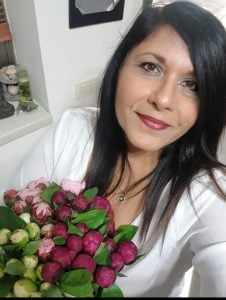
***
20:30 Objects and Memory: A Panel Moderated by Asaf Perry (Hebrew)
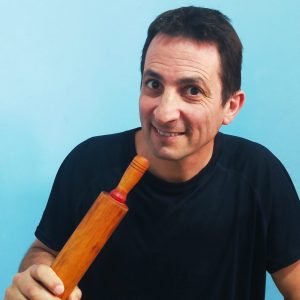
***
20:30 Pots of Longing: Ruthie Rousso and the Families of Fallen Soldiers Talk About Their Family Table (Hebrew)
There is no greater act of love than cooking your child their favorite dish – and no greater ache than that same pot as it sits untouched, still full. Since the outbreak of the Iron Swords War, over 800 IDF soldiers have fallen, and each left behind a broken family, parents with a missing part of their hearts embodied by the empty chairs at the dinner table.
In an emotional and heart-rending event, culinary maven Ruthie Rousso will speak with the parents of three fallen IDF soldiers: Avi Harush, Rif’s father, and Adi Livne, Asif Luger’s mother, as well as Amos Baram, father of Ilai Baram who was murdered in Re’im on October 7th. Together they will speak about their children’s favorite foods, the flavors that defined their home, the small moments around the table that suddenly became priceless, and the memories that remain in each pot that bubbles on the stove. Click here for full details
